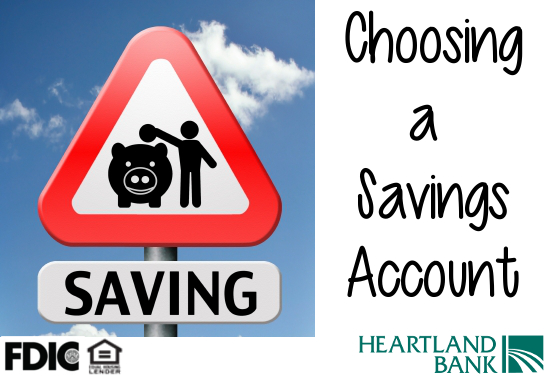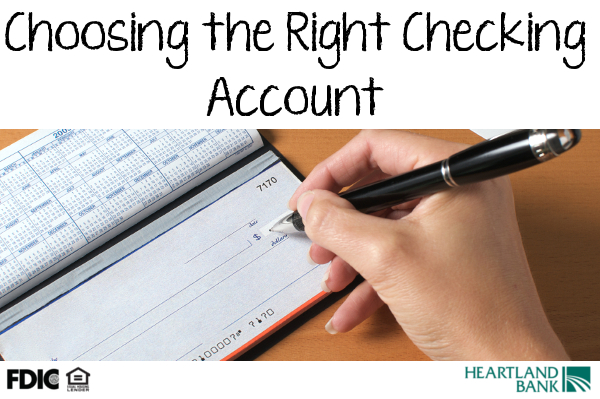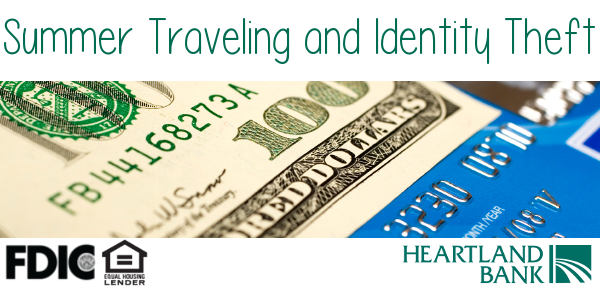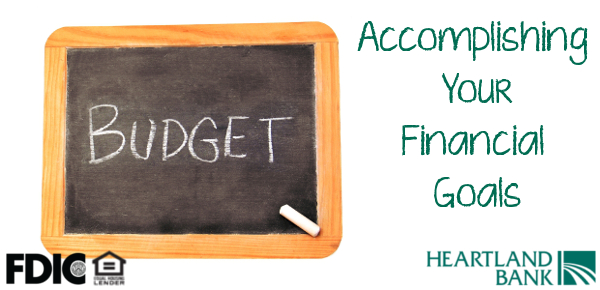Summer brings longer weekends and time away from work. Maybe you are lucky enough to go on a vacation, or you’re just spending time at home. Whatever the case, we have a few ideas for summertime home improvement for your days off. Today’s Heartland Bank blog has four ideas for summertime home improvement to add to the to-do list.
Author Archives: Heartland Banks Blogger
Tips for an Easier Financial Life during Simplify your Life Week
You’ve always wanted to simplify your finances. Whether that is through simplifying your investments or creating an emergency fund, now is the time to finally do so. The first week of August is Simplify your Life week and Heartland Bank is bringing you tips for simplifying your financial life.
- Buy and hold- the market is a fickle thing, so quit trying to “time” the markets. It only causes additional stress.
- Make a list of all your possessions- okay, so making the list may not be simple, but the purpose is simple. You can see which of the things you own are unnecessary and it will give a much needed wake up call to consume, spend and own less. Then…
- Sell half of your list in a month- have a garage sale, put your stuff up on eBay, list it on Craigslist. You’ll make some cash, reduce storage costs and learn what you really need to live well.
- Create and emergency fund- this takes discipline for many people, but there may come a time where you’ll be thankful you have it. Three to six months of living expenses should give you peace of mind.
- Simplify your investments- “diversified” and “simple” aren’t mutually exclusive. You should be able to describe what you’re investing in and how it works.
- Whatever it is you do well, do more of it- what gives the most value to your employer? Find out and replicate it as much as possible. No matter where you’re at in life, find out what extra value you offer and focus on that. You can’t be everything to everyone.
How can you implement these tips into your life this week? Share with us!
Heartland Bank is here for your wealth management, savings and agricultural banking needs.
Financial Tips for 20 Somethings
Living through your 20s can be a day-to-day financial struggle. While it seems difficult to think about your financial future while you’re dealing with your financial present, Heartland Bank is bringing you financial tips for your 20s and beyond. Keep these tips in mind while you venture through the next couple years. Continue reading
Saving for Retirement: Start Now!
“Start saving NOW for retirement!”… We hear these words a lot in today’s economy. But the fact of the matter is, if you really aren’t saving for retirement yet, now is the time to start! Continue reading
Traveling Increases your Risk for Identity Theft
Traveling comes with many adventures including exploring different cultures, exploring new food and relaxing for a few days. Traveling also brings a heightened risk for identity theft, so Heartland Bank is bringing you tips for decreasing your risk for identity theft while traveling. Continue reading
Accomplishing Your Financial Goals
Whether your financial goals are focused on saving for retirement, paying off student loans or having enough money to eat dinner next week, creating a monthly budget is the first step to financial success. Continue reading
Choosing a Savings Account

Choosing the right savings account can help you build wealth and take advantage of savings account benefits.
As Americans, we’re good at a number of things: backyard cookouts, baseball and hard work just to name a few. However, we aren’t very good at one crucial thing: saving money.
According to data from a 2015 survey done by NeighborWorks America, nearly a third of American adults have no emergency savings. This means that if they lost their jobs, nearly 72 million Americans would be hard pressed for cash.
You may be one of them. How do you fix this situation? The first thing is to have an account specifically for saving money. Here are a few tips for choosing a savings account that will fit your needs and give you the benefits you require:
- What are your savings goals? Short and long-term savings goals are important to know as they help you determine many of the answers to the next two questions…
- How large of a balance do you want to carry? There are minimum required balances on many savings accounts, as well as limitations on earning interest at certain balance levels.
- How accessible do you need your money to be? Remember, this is money that you may need in an emergency, so the more accessible the better. ATM accessibility or the ability to make transfers through online banking or mobile banking are things to look for.
- What services are included? Additional services like online banking or mobile banking that add convenience are a bonus.
- What fees go with this savings account? Withdrawal limit fees, minimum required balance fees, transfer limit fees and other fees may apply, so be sure you know which could apply to you.
Saving money should be a priority, and the right savings account helps you do it effortlessly while offering the amenities and access you need for success. For the best success selecting a savings account at Heartland Bank, call us or stop by and speak to a personal banker at any of our offices today!
Heartland Bank, Member FDIC
Managing Your Checking Account

Now that you have your checking account set up, it is important to properly manage your checking account to get the most out of its services.
How often do you think about your checking account? You might not think about it that much. Your finances are on auto-pilot, and there’s no need to look at your checking account unless there is an emergency.
Or is there?
Managing your checking account is a habit those who are smart with their money have mastered. But what exactly does “managing your account” entail? A few things:
- Making sure you stay above any minimum required balance
- Avoiding overdrafts
- Staying below any transaction or withdrawal limits
- Being able to have a good idea of your account balances at any time
- Monitoring your account activity to protect against fraud
Here are a few ways to keep an eye on your account:
- Use a checkbook ledger or duplicate checks- if you still write checks, be sure you record any purchases you make with a check in the ledger that came with your checkbook or use duplicate checks. This will ensure you aren’t surprised when a check clears.
- Use online or mobile banking – if you have access to an online banking or mobile banking account, you will be able to track your transaction history. Some online and mobile banking systems may also include financial management tools to help you track your spending by category. (LSB offers this!) This helps prevent overspending and helps track where your money is going.
- Check your monthly statements- you should be receiving monthly account statements, either through the mail or through an electronic delivery system like eStatements. These allow you to see all purchases and deposits for your checking account for the last billing cycle.
- Use a telephone banking service or text banking – telephone banking and text banking are other services most banks offer to help you monitor your balances and verify recent activity.
- Call your bank and ask- if you ever have questions about your account, you are well within your rights to call and ask your bank. Your bank has full access to all activity on your account and can help put your mind at ease.
Keep in mind that managing your account isn’t a once-a-month type of thing, but rather a regular activity you should be doing. This allows you to stay on top of your finances easier and avoid any surprises that you don’t want to have any way.
If you would like to know more or enroll in Online or Mobile Banking from Heartland Bank, stop by or call us today to start the process and have better accessibility to your checking account.
Heartland Bank, Member FDIC
Curbing Summer Spending
Summer in Central Iowa is great, isn’t it? The weather is warm, the days are long and the kids are out of school, meaning more family time. However, all these great things about summer can actually work against your wallet.
As we stay active for longer during the day or as the kids need more things to do, our checking accounts can take a hit. But how do we reduce the urge to spend when the season and our kids want us to spend more?
Try these five tips to keep your spending down and savings and fun up this summer.
- Get in the right mindset– Anna Newell Jones, author of the “And Then We Saved” blog, paid off $23,600 in debt in 15 months. How? One of her largest motivators was finding fulfillment without spending money. She wrote down three things she was thankful for every day as a way to teach herself to be content and to stop searching for “more” and “better.” Take a page out of Anna’s book and try to focus on the great things you already have.
- Try out “no-spends”- build up your savings account by trying out a days, weeks, or, if you can, months of no spending. While you may not hit your goal of spending nothing, focusing on spending less will help.
- Clear out your mind and your home- kick off your savings quest with a spring cleaning session, recommends financial writer Kali Hawlk. Not only will this help you in selling things you need and finding things you forgot you had, but it will also help you re-tune your wants.
- Do more of your own cooking- it’s so easy to “grab a quick bite to eat” somewhere or to take the kids out for dessert on long summer evenings. Instead, produce more meals at home. They are generally healthier, in smaller portions and more satisfying than $40 spent at a restaurant that can be too cold or too loud.
- Look for budget-friendly activities- church camps and activities put on by community organizations are often low in cost, so be on the watch for those. There are also plenty of festivals, outdoor parties and other events during the summer that may cost little or nothing for an evening of family fun.
Not all fun things cost money. You can do your own research on the Internet or websites like Pinterest to find free or low-cost things to do this summer. If you need our help, you can always call or stop by any Heartland Bank office.
Heartland Bank, Member FDIC
Choosing the Right Checking Account

Choosing the right checking account is important and we want to help guide you the right best account for you.
Few things are as important to your finances as your checking account. It’s where you store the money you earn to use on essentials like your home, vehicle, food and clothing.
Having the right checking account can make your life infinitely easier, while having the wrong checking account can make your life much more difficult. But with all the checking account options available these days, how do you know where to start when choosing an account?
These five questions will help you narrow down the list:
- Are you single or married? Some checking accounts have balance requirements or benefits that are triggered at various balance levels. If you are single, your balance will probably be lower than if you are married with a joint checking account that two people contributing to the account.
- What services are included? These include things like a debit card, online banking access, access to an online bill pay feature, electronic bank statements, direct deposit, remote check deposit or other services that make managing your money easier.
- What are the balance requirements? Some accounts incur a fee when your balance drops below a certain amount. For instance, if you use most of your paycheck between pay periods, you would be better off with an account with a low minimum balance requirement.
- Are the fees minimal, or can they be avoided? Fees can include monthly maintenance fees, fees for not hitting a certain number of transactions and so on. Most accounts have stipulations to help you avoid fees, such as a certain number of debit transactions per billing period.
- What are the account benefits? Many checking accounts have perks associated with them, including interest earned on the balance, cash back, or other account benefits like rewards programs. Make sure you understand your benefits so you can maximize them.
By answering these questions, you can better determine which type of checking account is best for you. You can also stop by or call any Heartland Bank office to ask our banking staff for help when trying to decide on a checking account.
We look forward to seeing you soon!
Heartland Bank, Member FDIC








